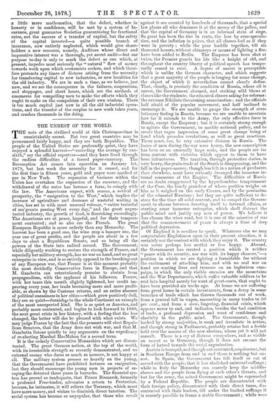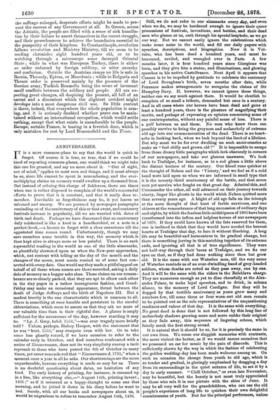THE UNREST OF THE WORLD. T HE note of the civilised
world at this Christmas-time is unmistakably unrest. But two great countries may be pronounced fairly happy, and they are both Republics. The people of the United States are profoundly quiet, they have enjoyed a splendid harvest—" exceeding the average by one- sixth," say the official reporters—and they have lived through the endless difficulties of a forced paper-currency. The Resumption Act comes into operation on January 1st, 1879, but last week the necessity for it ceased, and for the first time in fifteen years, gold and paper were marked at par in New York. The expansion of business within the Union has overtaken the expansion of the currency, and the withdrawal of the notes has become a form, to comply with the law. The Americans expect, with reason, a revival of prosperity, the "emigration to the West," which implies the increase of agriculture and decrease of wasteful waiting in cities, has set in with most unusual volume, " entire trainsful of em'grants passing West every day," and the great unpro- tected industry, the growth of food, is flourishing exceedingly. The Americans are at peace, hopeful, and for their tempera- ment contented; and so also are the French. The great European Republic is more orderly than any Monarchy. The harvest has been a good one, the wine crop a bumper one, the year one of great profits, and the people are about in a few days to elect a Republican Senate, and so bring all the powers of the State into radical accord. The Government, while diligently working to restore the strength of France, and especially her military strength, has no war on hand, and no great enterprise in view, and is so entirely opposed to the breaking-out of any European war, that France is at this moment probably the most decidedly Conservative force in Europe, and that M. Gambetta can ostentatiously promise to abstain from propagandism, with the applause of his followers. France, with her taxes this month slightly lightened, her credit im- proving every year, her trade becoming more and more profit- able, as shown by the Customs returns, and an entire absence of political uneasiness in her cities—which grow positively dull, they are so quiet—furnishts to the whole Continent an example of the most unexpected kind. She is as quiet as America, and probably more contented, and begins to look forward to 1880, the next great crisis in her history, with a feeling that the less changed, the better will she be pleased with what exists. We may judge France by the fact that the peasants will elect Repub- lican Senators, that the Army does not wish war, and that M. Gambetta listens quietly to any arguments on the expediency of re-electing Marshal MacMahon for a second term.
It is the orderly Conservative Monarchies which are discon- tented. The great German nation, at the top of the world, with its irresistible strength so recently demonstrated, and no external enemy who dares so much as menace, is not happy at all. The military system presses so heavily on the young, that the Government have prohibited lectures on emigration, lest they should encourage the young men in projects of es- caping the detested three years in barracks. The financial sys- tem has proved so inadequate, that Prince Bismarck, formerly a professed Free-trader, advocates a return to Protection, because, he intimates, it will relieve the Treasury, which must have more money, and wishes to diminish direct taxation. The social system has become so unpopular, that those who revolt against it are counted by hundreds of thousands, that a special law places all who denounce it at the mercy of the police, and that the capital of Germany is in an informal state of siege. So great has been the rise in rents, the loss by over-specula- tion, and the inflation in prices, that all classes feel as if they were in poverty ; while the poor huddle together, till six thousand houses, without chimneys or means of lighting a fire, have been added to Berlin. The Emperor has been shot at twice, the Premier guards his life like a knight of old, and throughout the country liberty of political speech has tempo- rarily ceased to exist. A degree of unrest is perceptible which is unlike the German character, and which suggests that a great majority of the people is longing for some change, the object of which it nevertheless cannot clearly define. That, clearly, is precisely the condition of Russia, where all is unrest, the Government alarmed, and striking wild blows at classes like the students; the educated classes asking for reforms: the extreme Nihilists threatening assassination ; and the officials half afraid of the popular movement, and half inclined to encourage it. We are unable to gauge the strength of revo- lutionary feeling in Russia, because we are unable to ascertain how far it extends to the Army, the only effective force in Russia, except the Emperor ; but it is certainly strong enough to agitate the Government, to modify national policy, and to create that vague impression of some great change being at hand which precedes revolutions, as well as great reactions. There must, too, be very extensive distress in Russia. The losses of men during the war were heavy, the new conscription has been on an unusually large scale, and the people are far from content with victories which appear to them to have been infructuous. The taxation, through protective duties, is very heavy, the grain-trade of the South is disappearing, and the fall in the paper-money, though less felt in a nation of producers than elsewhere, must have seriously deranged the immense in- ternal commerce of the Empire. The difficulties of Russia are no doubt exaggerated by the hypochondriac temperament of the Czar, the lonely grandeur of whose position weighs on him as it weighed on the early Ccesars, and by the pessimism of the educated Russians ; but they are quite sufficient to de- stroy for the time all solid content, and to compel the Govern- ment to choose between devoting itself to internal affairs, or starting some immense enterprise, which shall distract the public mind and justify any acts of power. We believe it has chosen the wiser road, but it is one of the miseries of war that the commencement of peace is always a time of deep political depression.
Of England it is needless to speak. Whatever else we may congratulate Englishmen upon in their present situation, it is certainly not the content with which they enjoy it. The country was never perhaps less restful or less happy. Abroad, the Government has created a position which is neither "peace with its security, nor war with its happy chances,"—a position in which we are fighting a formidable foe without the excitement of attacking him, and with no real war on hand are wasting lives and treasure on an inglorious cam- paign, in which the only visible enemies are the mountains and the War Departments, which suffer valuable soldiers to be sent into hospital merely for want of great-coats, that ought to have been provided six weeks ago. At home we are suffering from great losses in certain investments, from a decay in some branches of trade which has thrown thousands out of work, from a general fall in wages, amounting in many trades to 50 per cent., and from a slow, lingering, financial crisis, which appears never to end, and indicates, besides the bad condition of trade, a profound depression and want of confidence and elasticity in the public mind. The Government, though backed by strong majorities, is weak and irresolute in action, and though strong in Parliament, probably retains but a feeble hold over the masses of the new electors, whom yet it will not consult. There is a cry of distress everywhere, and as visible an unrest as in Germany, though it does not assume the form of hatred towards the social organisation.
Austria is tranquil, and though not contented, acquiescent, but in Southern Europe from end to end there is nothing but un- rest. In Spain, the Government has felt itself so out of accord with the people, that it has abolished universal suffrage while in Italy the Monarchy can scarcely keep the middle- classes and the people from flying at each other's throats, and but for the army, the mixed Government might be superseded by a Federal Republic. The people are discontented with their foreign policy, discontented with their direct taxes, dis- contented with their leaders, till under the limited suffrage it is scarcely possible to frame a stable Government ; while were the suffrage enlarged, desperate efforts might be made to pre- vent the success of any Government at all. In Greece, across the Adriatic, the people are filled with a sense of sick humilia- tion by their failure to assert themselves in the recent struggle, and their powerlessness to achieve the boundaries essential to the prosperity of their kingdom. In Constantinople, revolution follows revolution and Ministry Ministry, till we seem to be reading chronicles eight hundred years old, or to be watching through a microscope some decrepid Oriental State ; while in what was European Turkey, there is either an order enforced by foreign soldiery, or utter anarchy and confusion. Outside the Austrian camps no life is safe in Bosnia, Thessaly, Epirus, or Macedonia ; while in Bulgaria and Thrace order is preserved mainly by the presence of the Russian army, Turkish Boumelia being the scene of incessant small conflicts between the soldiery and people. All are ex- pecting great changes, all despising the present, all full of an unrest and a discontent which the slightest accident might develepe into a most dangerous civil war. So little content is-there, indeed, that everywhere the whole population is arm- ing, and it is seriously doubted whether peace can be main- tained without an international occupation, which would settle nothing, except that what exists is unendurable to the people. Europe, outside France, is tossing in a feverish doze, which is only mistaken for rest by Lord Beaconsfield and the Times.



































 Previous page
Previous page